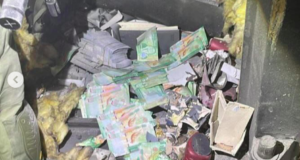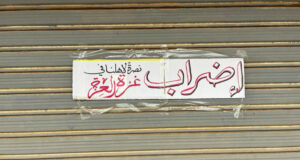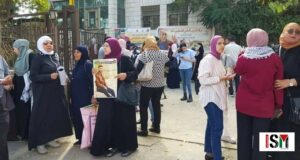By Gideon Levy
To view original article, published by Haaretz on the 28th August, click here
This is Israeli justice in a nutshell: Lt. Col. Omri Burberg, the battalion commander suspected of giving an utterly illegal order to shoot a bound Palestinian, is wandering free and being considered for a senior training post in the Israel Defense Forces. Meanwhile, Jamal Amira, the father of Salam, the amateur camera operator who filmed the shooting, spent 26 days in an Israeli jail, until a military judge was so kind as to release him on bail last week.
“Although the claim that the IDF sought revenge is weak,” wrote Lt. Col. Yoram Haniel, the military judge, “one cannot overlook the fact that out of all the protestors, only the complainant was arrested.”
Indeed, it can’t be overlooked. Jamal Amira was arrested just after after B’Tselem released the video, filmed by his daughter, of the horrible shooting of the bound Palestinian man. He says that when the Border Police officers arrested him, they called out to one another, “We caught Salam’s father.” Amira, 53, a father of nine, has many Israeli friends, including a senior IDF reserves officer. Amir was thrown into Ofer Prison in what can only be interpreted as an act of revenge by those who presented themselves as “friends of Omri.”
In Na’alin, the village presently embroiled in a resolute and brave civil struggle over the remainder of its land, on which Israel seeks to build the separation fence, celebrated Amira’s release this week. But Amira went straight from the prison to the graves of two men from the village who died in the fight for their land: Ahmed Moussa, 11, and Yussef Amira, 22. Only later was he available to join the party and fete dozens of visitors, among them his Israeli friends from nearby Moshav Shilat.
Over the weekend, the villagers of Na’alin once again rushed one of their friends to the Ramallah hospital: Hitham Alian, 21, was shot in the head on the way to visit his grandfather. The image of his bleeding head adorns almost every mobile phone in Na’alin.
“This is a closed military zone,” barked the Border Police thugs who welcomed us at the checkpoint closing off Na’alin, barring our entrance to the village. A few minutes later, the officers disappeared and the closed military zone suddenly turned into an open civilian zone, if just for a moment. A scratchy loudspeaker called the children of the village to a back-to-school party, and the gravel road to the ancient olive grove – the one Israel plans to expropriate and uproot – was carpeted with stones, a reminder of the daily struggle here. Israel is building the fence to the east of the Green Line, with the sole purpose of expanding the borders of Kiryat Sefer and Hashmonaim, the two large settlements already constructed on land stolen from Bil’in and Na’alin. How do the ultra-Orthodox residents of Kiryat Sefer and the people looking for “high quality of life” in Hashmonaim feel, knowing the land underneath their houses was robbed from others? It probably doesn’t keep them up at night, but when they stand in front of the spectacular valley of olives, and they see how the fence route tears Na’alin’s farmers from their groves, the heart cannot help but notice. Roughly 57,000 dunam (about 13,500 acres) before 1948 turned into 33,000 dunam before 1967, and now the 5,000 residents of the village are about to be left with only 7,000 dunam. The fence will rip away from them an additional 2,500 dunam.
“All we can do now is stare at the ceiling,” says Jamal Amira, who stands to lose 138 dunam to the glory of the separation fence and Hashmonaim.
“I’m sure there will be farmers who will have heart attacks when olive picking season arrives and they can’t get to their trees,” says his son Mohammed, who terms what is happening the “new occupation of Na’alin” and the separation fence “the theft fence.”
In a white galabiya and fluent Hebrew, Jamal offers us figs, “my last figs.” The sound of the bulldozers is in the distance, and Amira is barred from approaching his land due to a restraining order. After his arrest 70 of his olive trees were cut down and two wells on his property were destroyed. Mohammed is convinced that this too was in revenge for his sister’s documentation of the shooting, because he was promised the wells wouldn’t be touched.
On Sunday, July 20, Salam filmed the shooting of Ashraf Abu Rahma, who was bound at the time. The video was made public the following day by B’Tselem, which had given Salam the video camera.
“At first we couldn’t believe it,” recalls Mohammed, who was standing next to Salam as she filmed. “We were sure the officer would put Ashram into the jeep. In the evening, when we saw the video, we were happy. We were happy to have released such a thing into the world. We wanted to show the world, and especially the Israeli Defense Ministry, what IDF soldiers are doing to us. Come see the actions of the battalion commander, a lieutenant colonel with two ‘falalels’ [oak-leaf clusters], the commander of Na’alin. First he imposed a total curfew on us, a closure on 5,000 people to guard a couple of tractors, and now this shooting.”
“Omri” had long been vilified in Na’alin, following the five-day curfew on the village and his rude behavior to the residents. “Put that kind of officer in Lebanon, but why in Na’alin?” asks Jamal.
Mohammed says they were afraid, at first, to publicize the video. “We were scared the army would do something to us. The B’Tselem people promised us that nothing bad would happen to us. But our fears came true. There was revenge. After two days, my father was arrested. After three days, I was shot in the leg with a rubber bullet while leaving my house. We don’t have one unbroken window in our house. Sometimes the soldiers ask me, ‘Have you filmed us today?’ That’s how it’s been every day since then.”
Three days after the video was released, on July 23, a women’s demonstration took place in the olive groves, and Jamal joined. The villagers always make sure that one of the owners whose land is about to be taken accompanies every protest. Jamal began arguing with the Border Police officers, one of whom told Jamal the land was not his. Jamal, furious, began devouring clods of earth. His son Ghaleb watched from a distance as officers attacked and kicked his father. The family has a video to prove it. Jamal was put into the jeep. He was handcuffed and blindfolded. He heard the officers say to each other, “We caught Salam’s father, the camerawoman’s father.”
He was driven to Hashmonaim, where he says he was left sitting on the ground for about three hours. He asked for water and was refused. After several hours, officers poured water on his face. “Omri is my friend,” Jamal says one of the officers told him. They eventually brought him to a Border Police base next to Maccabim and left him handcuffed in the jeep for another three or four hours, still with no water. He says many Border Police officers came to see “Salam’s father.” When he asked for water again, he says one of them responded, “Eat your camera.” “I’ll screw you” is another sentence from an officer that Jamal hesitates to quote.
After sunset Jamal was brought to Beit El for questioning. He was charged with assaulting Border Police officers. Eventually he was taken to Ofer Prison. That first night he suffered from pains in his ribs that he attributes to the blows he received during the demonstration. The following morning he was seen by a doctor.
After eight days in jail Jamal was brought to court. He is effusive in his praise for Gaby Lasky, the human rights lawyer brought to defend him, but she was unable to secure his release at the first military court hearing. His remand was extended until the end of proceedings, and Jamal remained in jail for over two weeks before his appeal was heard.
Some of his Israeli friends came the court hearings. He asks for them to be named: Col. (res.) Ami Arazi, Shlomo Rav-On, Rafi Reuveni and Ilan Kuperstein of Shilat. Palestinian Prime Minister Salam Fayyad and MP Mustafa Barghouti visited his home while he was in jail. The family has a photo of Fayyad with Salam, the camera operator and heroine of the family.
The Border Police and the IDF did not issue a response before press time.
Jamal can certainly be considered a “good Arab.” In his first hearing, he told the prosecutor that he has done much for Israel. “Just move the fence to the wadi, and I’ll drink coffee on the fence with any Israeli,” he says repeatedly. His sons all speak Hebrew well. Their home is the first house after the IDF checkpoint at the entrance to Na’alin and they host many Israeli guests there. He fears he will no longer be able to offer them figs and olive oil from his groves. After his release from jail, after a series of delays and humiliations, half the village was waiting for him at the checkpoint.
Jamal’s trial will take place soon. He is charged with disrupting the peace, assaulting a soldier and entering a closed military zone – his private property. Military court judge Lt. Colonel Yoram Haniel wrote, “It is doubtful that the evidence in the case will lead to a conviction.”
 International Solidarity Movement Nonviolence. Justice. Freedom.
International Solidarity Movement Nonviolence. Justice. Freedom.


